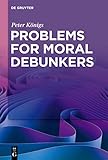Problems for Moral Debunkers : On the Logic and Limits of Empirically Informed Ethics / Peter Königs.
Material type: TextPublisher: Berlin ; Boston : De Gruyter, [2022]Copyright date: ©2022Description: 1 online resource (VIII, 146 p.)Content type:
TextPublisher: Berlin ; Boston : De Gruyter, [2022]Copyright date: ©2022Description: 1 online resource (VIII, 146 p.)Content type: - 9783110750171
- 9783110750218
- 9783110750195
- 170 23
- BJ43 .K65 2022
- online - DeGruyter
- Issued also in print.
| Item type | Current library | Call number | URL | Status | Notes | Barcode | |
|---|---|---|---|---|---|---|---|
 eBook
eBook
|
Biblioteca "Angelicum" Pont. Univ. S.Tommaso d'Aquino Nuvola online | online - DeGruyter (Browse shelf(Opens below)) | Online access | Not for loan (Accesso limitato) | Accesso per gli utenti autorizzati / Access for authorized users | (dgr)9783110750195 |
Frontmatter -- Acknowledgments -- Contents -- 1 Introduction -- 2 Deontology, Utilitarianism, and Evolution -- 3 Deontology, Utilitarianism, and Experimental Ethics -- 4 Deontology, Utilitarianism, and Morality as Problem-Solving -- 5 Deontology, Confabulation, and the Structure of Philosophical Debate -- 6 Realism, Constructivism, and Evolution -- 7 Morality, Wellbeing, and Evolution -- 8 Conclusion -- 9 References -- Index
restricted access online access with authorization star
http://purl.org/coar/access_right/c_16ec
One the most interesting debates in moral philosophy revolves around the significance of empirical moral psychology for moral philosophy. Genealogical arguments that rely on empirical findings about the origins of moral beliefs, so-called debunking arguments, take center stage in this debate. Looking at debunking arguments based on evidence from evolutionary moral psychology, experimental ethics and neuroscience, this book explores what ethicists can learn from the science of morality, and what they cannot. Among other things, the book offers a new take on the deontology/utilitarianism debate, discusses the usefulness of experiments in ethics, investigates whether morality should be thought of as a problem-solving device, shows how debunking arguments can tell us something about the structure of philosophical debate, and argues that debunking arguments lead to both moral and prudential skepticism. Presenting a new picture of the relationship between empirical moral psychology and moral philosophy, this book is essential reading for moral philosophers and moral psychologists alike.
Issued also in print.
Mode of access: Internet via World Wide Web.
In English.
Description based on online resource; title from PDF title page (publisher's Web site, viewed 02. Mai 2023)


